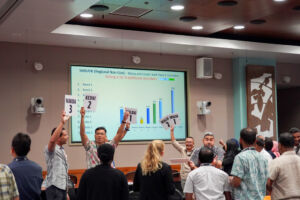 In an exercise that embodied the security dynamics of the ever-evolving Indo-Pacific region, 103 Fellows participated in the Center’s Great Game.
In an exercise that embodied the security dynamics of the ever-evolving Indo-Pacific region, 103 Fellows participated in the Center’s Great Game.
The full-day exercise, created by DKI APCSS professor Deon Canyon, took place on October 13 during week 4 of the Comprehensive Security Cooperation course. The Center faculty divided the Fellows into 6 country teams that made up the fictitious Aloha Sea Region. The exercise took place in Maluhia Hall, the Center’s 10,000 sq. ft. conferencing space with 6 seminar rooms.
With the goal of improving the security and stability of the Aloha Sea Region, Fellows elected their country team’s leaders and diplomats. As country teams established their national strategies, they began submitting “moves” to a control desk of DKI APCSS faculty. If approved, their moves potentially furthered their countries’ interests and scored points to win the game.
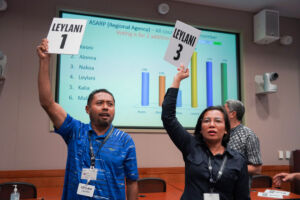 As the exercise began, Canyon recognized that this group of Fellows had quickly adapted to the game’s parameters. Within the first 15 minutes, one Fellow was seen wandering from room to room. Upon questioning, the Fellow gleefully admitted that he had been sent out by his country’s government as a spy to infiltrate the other team’s meetings.
As the exercise began, Canyon recognized that this group of Fellows had quickly adapted to the game’s parameters. Within the first 15 minutes, one Fellow was seen wandering from room to room. Upon questioning, the Fellow gleefully admitted that he had been sent out by his country’s government as a spy to infiltrate the other team’s meetings.
A knock at the door interrupted their debate as one country team worked fervently to elect its leaders and adopt its national strategy. The door opened to reveal a traveling diplomat who shouted her intent, “I am a diplomat from Lelani, and I am here to seek a partnership and alliance!” Soon the doors remained open as Fellows crisscrossed Maluhia Hall to advocate for their respective national strategies. With differing resources and, at times, conflicting interests, the Fellows collided in a flurry of role-playing diplomacy.
Throughout the exercise, 12 different screens broadcasted a live Twitter feed that announced actions from each country. One country moved to create an artificial island in the middle of international waters. Another government initiated a disinformation campaign alleging human rights violations and sexual assault allegations from the leadership of an opposing team. While teams were permitted to engage in tactics like disinformation campaigns, such actions did not improve regional security and, accordingly, did little to improve the team’s score.
A break in the game allowed time for the Fellows to elect representatives for Aloha Sea’s four regional entities. Utilizing a live poll, the Fellows voted on who would serve on the regional boards.
While some teams succeeded in garnering financial and economic support, others saw the deterioration of partnerships. Countries with more significant resources partnered together to seize control of unclaimed island territories. Teams successfully negotiated Memorandums and Trilateral Agreements that allowed for the exchange of defense services, clean energy, and the receipt of vaccines to combat the “Evil Virus.”
Throughout the day, the six countries made a total of 160 moves. When the Center faculty finally tallied scores, the country team “Malia” came out on top to receive the Great Game Trophy. Malia’s elected “president” accepted the award on his team’s behalf.
In observing the actions of the Fellows, Canyon gleaned several insights. In the unstable and uncertain game setting, most Fellows said that their highest achievement was some form of cooperative multilateral arrangement and that other players’ unknown motivations were the most significant challenge. He also recognized that the less affluent nations focused on development while resisting illegal activities to develop at a faster pace.
The Great Game is the latest in a series of “Gray Zone” gaming exercises created by Deon Canyon. According to Canyon, these exercises allow participants to experience difficulties in international negotiation and cooperation. Fellows learn how to influence and negotiate with many different stakeholders as they navigate toward improving security cooperation. More importantly, the exercise allows participants to face challenges that currently exist in the Indo-Pacific region.
Said Canyon, “Ultimately, it’s a tool for [Fellows] to gain insight into the future and test their perceptions and assumptions.”



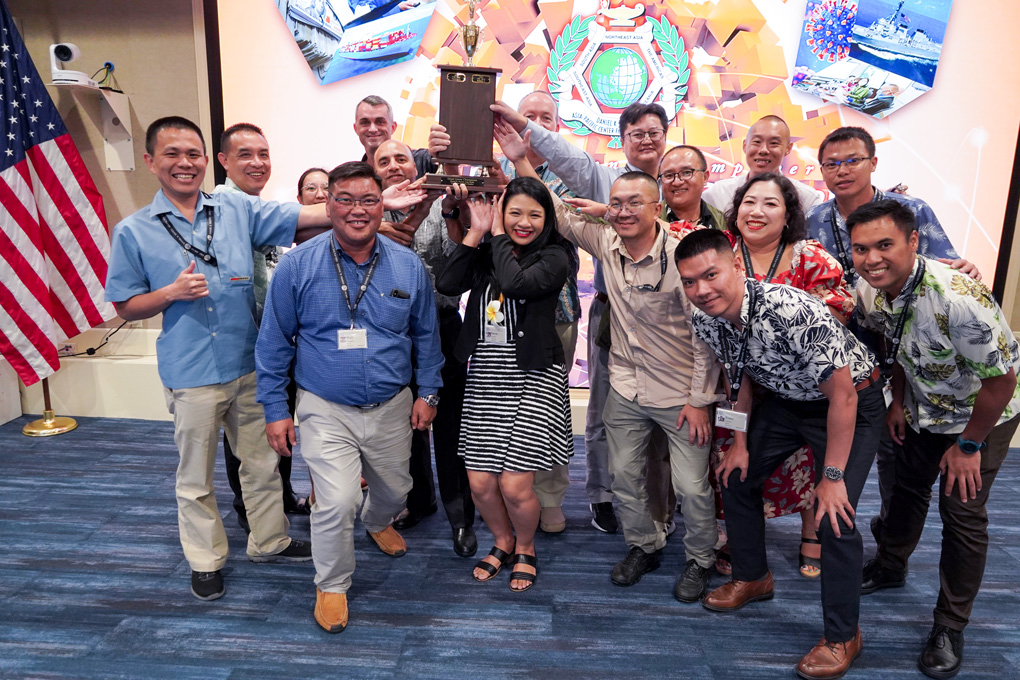
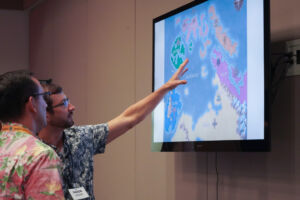
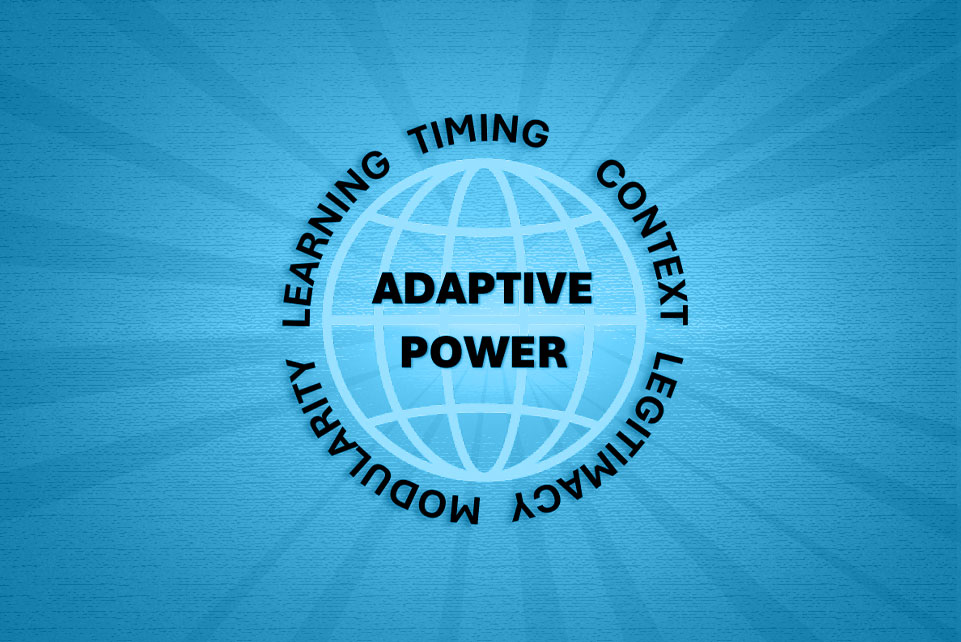
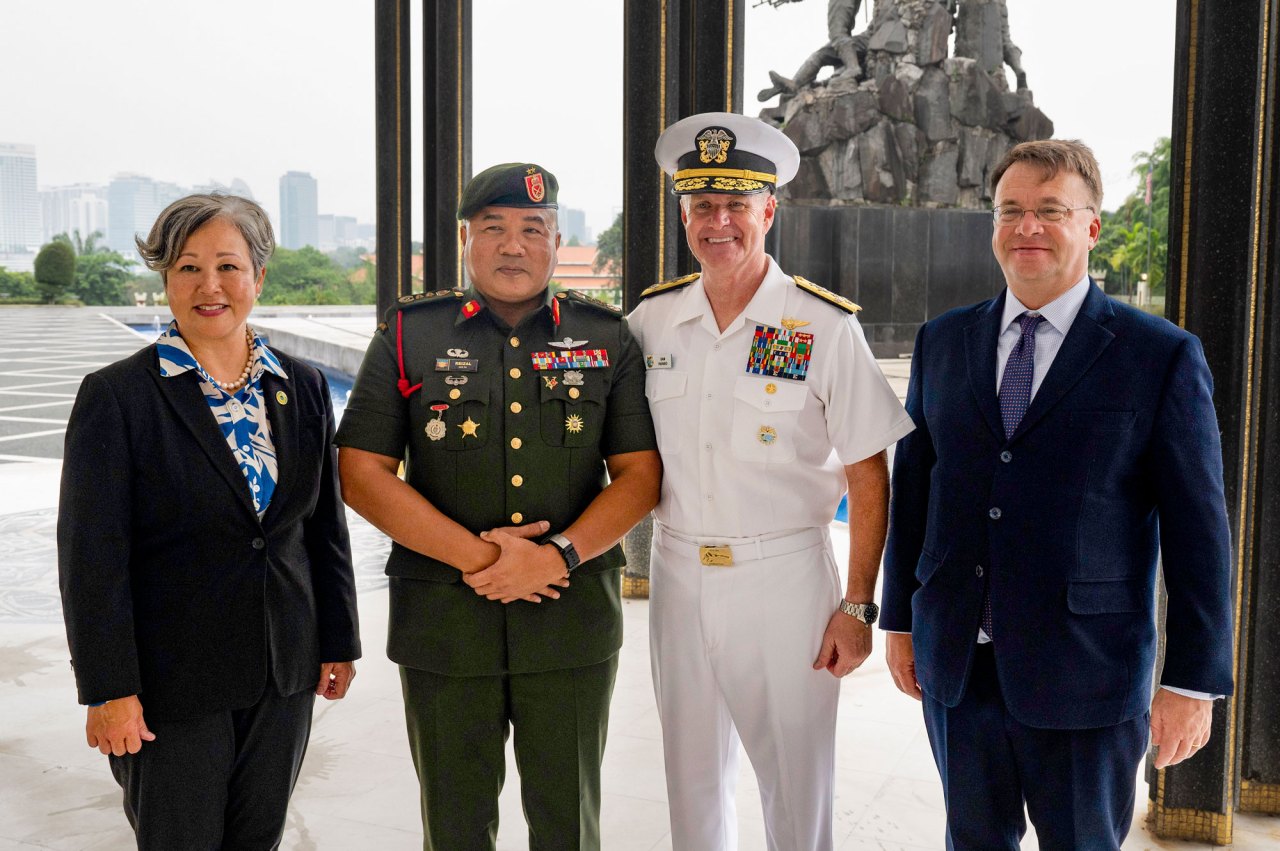





Leave A Comment